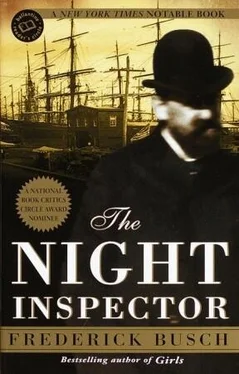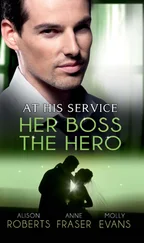“No,” Sam said. “Why should you not speak your heart? These are your people.”
M said, “They must be ghosts to a man who seeks to rise. They must pull him backwards by the tenderest emotions. To improve, you must flee. To be human, you must hear the voice behind you and turn and—”
I thought of Sam as picket, asking me for the parole, and telling me about the pillar of salt. I thought of men falling over and turning gray as they fell, their blood pulsing away. And I thought, of a sudden, about my uncle Sidney Cowper, who did not die as a pillar of salt, but who drowned in a privy in the cold, cruel countryside of upper New York State, turning even as he died into the substance that was at his core. He had grown heavy, as I could tell in those days when I returned, on a rare visit, from school; in the night, from my room in the little house, I heard my mother grunting as he had her. She sounded as though the strain upon her frame was great. And it was clear that her emotions were taxed. Her eyes were underscored with dark, lined flesh. Her mouth was bitter of expression, and she wept easily over small matters she would once not have noticed. When I asked after her health, she leaned upon me as if she would hide inside my chest.
I did chores during that Christmas season with a special fervor, and Uncle Sidney Cowper noticed my enthusiasm, rewarding it, as he said, with a little bit extra in an envelope that I might spend on food and drink at school. I worked about the house when he was gone, and passed enough time in the privy so that my mother inquired after the state of my digestion.
On the day of New Year’s, when he was readying to ride to a little place called Poolville, over the hills from us, where he was determined to drink great quantities of a homemade corn whiskey prepared by two bachelor friends, one of whom was a schoolteacher, he visited the privy before departing.
We did not hear the crack of the dowels affixing the seat, already worn through with a wood rasp and touched up with creosote. We heard only a distant, muffled shout.
“Oh, dear,” I said to my mother in the kitchen, where I was peeling apples for her. “I had better see what’s happened.” She was lost in the cooking preparations, or hiding herself within them, and she did not hear.
I put on my frayed mackinaw and went to the outhouse, where, as I expected — as I insisted I would find — Uncle Sidney Cowper had set his great bottom on the weakened seat and had plummeted through. It was a well-made privy, and the seat, built as it was on a platform that was sited on a raised floor, was a good five feet to the little lake of stool and piddle beneath. He was mewing his disgust and dread. From the dark corner, I retrieved a short birch bough and with it I kept my uncle Sidney Cowper where he belonged, drowning in shit. Each time he made a sound or tried to shape a word, I knew, he drew it in through his nostrils or mouth. I pressed, and I could hear him gag and struggle and strangle, and I smiled. I did not feel a regret. I could only hope that he might leave my mother a whopping sum for her agonies. Then, in not too long a while, I tossed in the bough.
I saw his little carpetbag on some stones near his horse, purchased from the Paynes Corner smithy, and I slipped the handles over the pommel of the saddle, slapped the horse’s rump, and sent him on his way. He would amble in at the smithy’s, I thought, and someone would reluctantly conclude that searching was a necessity. I did regret that decent men would have to suffer from the cold in such a futile hunt, and I was pleased that I could feel something like sorrow, even if only this distant cousin of the true emotion. I retrieved from our shed the new seat I had days before cut and darkened. Above him, where his body had turned, facedown, to float like the hugest of turds, I affixed the seat with new dowels.
I returned to the kitchen, hung up my coat, and sat again at the bowl of apples. I wiped my palms against my shirt, then set to.
“What was the matter, then, Billy?”
“I thought I heard a cry from far away in the woods.”
“Nothing, eh?”
“Not a thing.”
“And your uncle is off?”
“Seems long ago launched on his way.”
She slumped against the edge of the table. She had lost weight, and had been slender to begin with. Now she looked old; now I felt older. She would spend the winter, once I left to return to New Haven, in covering his body with her stool. That would trouble her if he was found. On the other hand, I thought, he might do us a mighty favor and decompose with rapidity, and she might never need to know and I might never need to be hanged for murdering my uncle in a stew of corruption. I did not wish to die of choking, or a broken neck, but — and I was interested to learn it — I did not, finally, care.
“What’s that,” she said, “that makes you smile?”
I said, “Pardon?”
M said, “What have you and our dusky Virgil in mind for us now?”
“Adam, can you stand to lead us on one more descent?” I asked.
In the flare of the streetlight, he looked ill. He softly clapped his hands and rubbed them together, as if preparing to lift a great weight.
“Then, the crib?”
He nodded again, and turned and walked away. “Poor fellow,” M said. “He is loyal and distraught and noble.”
“Tashtego,” Sam ventured, naming a character from the book about the whale.
“No, son, he was Indian, you’ll recall.”
It was not an alley we entered this time. It was a house, narrow and wooden, sandwiched between a piano manufactory and a dealer in scraps of metal and old machines. A dog as great as a small horse, with a blunt, smooth head, was tethered on a chain to the loading dock to guard the scraps of iron and pewter and steel inside the dull stone building. When we passed, many yards from him, and on the other side of a wrought iron fence, he stood absolutely still and fixed us with a glaring study. Sam made an affectionate, chucking sound to him, and he silently bared his fangs.
Adam spoke for us to someone at the door of the house, and we went in.
M asked of Adam, “What do they provide?”
Adam, looking sullen, said, “White girls. Brown boys. Blind men. Bleeding women. Egyptians. Bohunks. Niggers of every persuasion. Whatever you prefer.”
Sam said, with more than a little apprehension, “I thought we were here to observe.”
M tilted back his head, as if to swallow some of the darkness of the ocher-tinted vestibule with its single, small lamp, and he soundlessly laughed.
“So we are, Sam, I assure you,” I said. I said to Adam, “You feel divided in this.”
“I feel ashamed of myself,” he said.
M gripped Adam’s arm, then lay his own arm along the man’s broad shoulders. “This is a brotherhood of shame,” he said. “What pride can breathe in the airless coffin of this life? Except, perhaps, the pride in not dying when circumstances suggest that you must.”
“I don’t know about that,” Adam said. “I just hate it.”
A fat black woman in a maid’s starched apron, her lips pursed in distaste, came to beckon us in and to our left, up an unlighted stairway and through a broad door and down a bright hall all covered in a dark blue textured cloth. We entered what seemed to be a small bedroom, and I gave her the money. She moved a painting of a waterfall, not a very alluring or realistic one, I would suggest, and then she dimmed the two gas lamps until we were in shadows. She gestured at the wall, as if to welcome us to what we might see, and then, turning the latch very quietly, she left.
It was awkward, fitting my mask to the small hole cushioned with velvet. I saw what they would see and gestured M to approach. He leaned to the aperture and stood very still. I heard his breath whistle. He stood there, and then he moved back. Sam went next, and he stared and stared, and then I returned to look once more. I turned to Adam, but he had gone to the far end of the room to sit at the head of the bed, his thick arms folded across his broad chest, his head drooped in a semblance of ease.
Читать дальше












